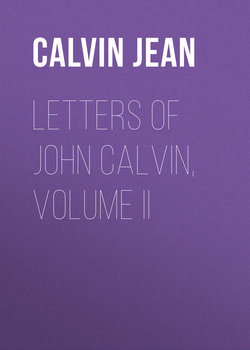Читать книгу Letters of John Calvin, Volume II - Calvin Jean, Jean Calvin - Страница 27
CLXX. – To Viret
ОглавлениеFresh details regarding the projects for his marriage
Geneva, 15th July 1546.
Three days ago, towards the conclusion of supper, mention was made of your marriage, which I had foretold you would be the case. But Dominic Arlot, whose assistance I had employed, presently interrupted the conversation; for he said that the matter was completed. On hearing this our friend instantly sprung up from table, and, in his usual way, gave reins to his indignation; for, says he, his whole body shaking, "Will he then marry that girl of low connections? Could there not be found for him in the city one of better family? Whoever have been the originators or abettors of this business, I regard them as vile and infamous. Of a brother and sister I am thus unwillingly compelled to speak." I, in reply, say, "I could not be the originator of it, inasmuch as the young lady was unknown to me. I acknowledge that I was a promoter of it, and, indeed, the principal one; but that the matter is finally settled, as Dominic has asserted, is not true, beyond this, that I have gone so far in it that to draw back would be dishonourable. In that there is nothing for me to be ashamed of." His fury was thus turned into laughter. But he again began to grow hot, because the matter had been concealed from him by you. He was especially inflamed with a foolish jealousy, because Corna confessed that you and he, while riding, had talked over the thing together. "Is it even so?" he proceeded to say to Corna. "Was it for this I attended him along with you, that he might in the most insulting manner shut out from his counsels the most attached friend he has in the world? [for] I would cheerfully prefer him to myself."
I objected that he himself drew a false conclusion, since you had not disclosed your mind even to Farel. He was, therefore, again pacified, though he talked of the daughter of Rameau, whom he extolled in an extraordinary manner. I nodded assent to all the encomiums, that I might remain firm in regard to the other party.
Consider, now, whether it be expedient for you to come into the city disengaged. For there will be a hateful apologizing, if they proceed to obtrude her upon you. I know how dangerous even it may be to give a promise before the natural disposition of the girl has been ascertained. I am full of anxiety, nor can I easily clear a way for myself. I think, however, that this course would not be ridiculous. Suppose you consent to my asking the young lady in your name, the condition being added, that before the betrothal takes place, you are to meet her, that we may give some certain promise. They will thus not dare to press you. Write in return, therefore, by the earliest possible messenger what your views are, although, at the same time, I give it as my advice that you should not delay long, but come on an early day. Of the lady, I hear nothing that is not highly pleasing. In her father and mother, also, there is nothing blamable. I am the more confirmed, when I see that our opponents have nothing to carp at beyond this, that it was impossible for them to frighten us from our purpose. There are some things about the daughter of Rameau which I fear; nevertheless, as it is your own affair, you will be free to choose. I will never, however, allow that there is any man on earth who has greater concern about his own matters than I have about the present.
This youth came to us from Italy, with the view of giving his attention to sacred literature, if a situation had been found such as he had hoped for. But as he has been disappointed, he wished, before he returned home, to pay you a visit. I have observed in him a truly good disposition. You will say a few words to confirm him in the fear of the Lord, and in reverence for his teaching. – Adieu. May the Lord direct you by his counsel, and bless you in a recommendation of so much moment. Salute respectfully all the brethren. – Yours,
John Calvin.
Forgive me for not having, some time ago, sent to you this letter by our treasurer – I mean Bucer's, for, as the messenger brought it open, I thought that it had been already read by you and Farel. Afterwards, he reminded me that not even Toussain had read it. You will therefore send it to Farel, as soon as you shall have an opportunity. I am surprised that Bucer was not aroused by the murderous outrage so greatly to be execrated, which the Emperor perpetrated when he struck off the heads of the principal senators at Ratisbon. I am also surprised that he has made no mention of the incendiaries, but I set it down partly to his engagements. The other matter he has perhaps passed over on purpose, because he did not dare to commit everything to writing in these dubious times.
[Lat. orig. autogr. – Library of Geneva. Vol. 106.]
